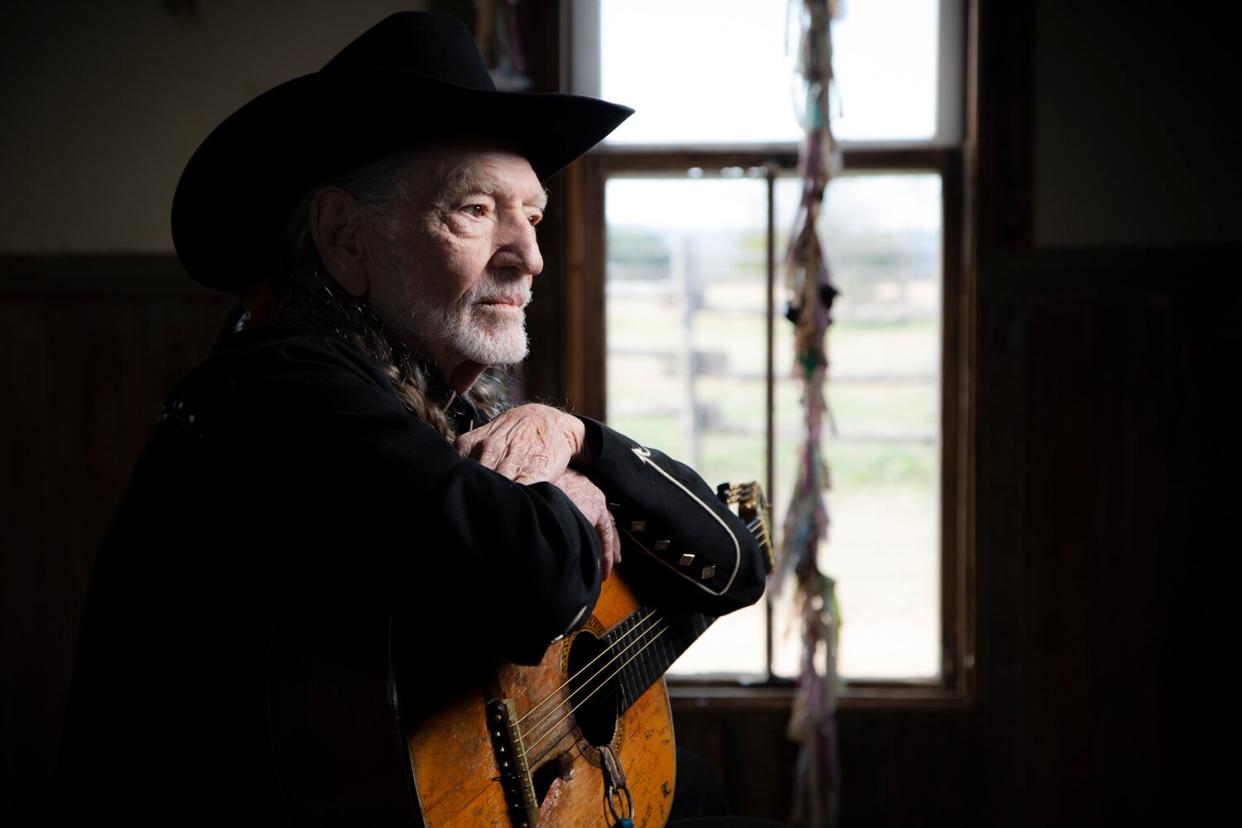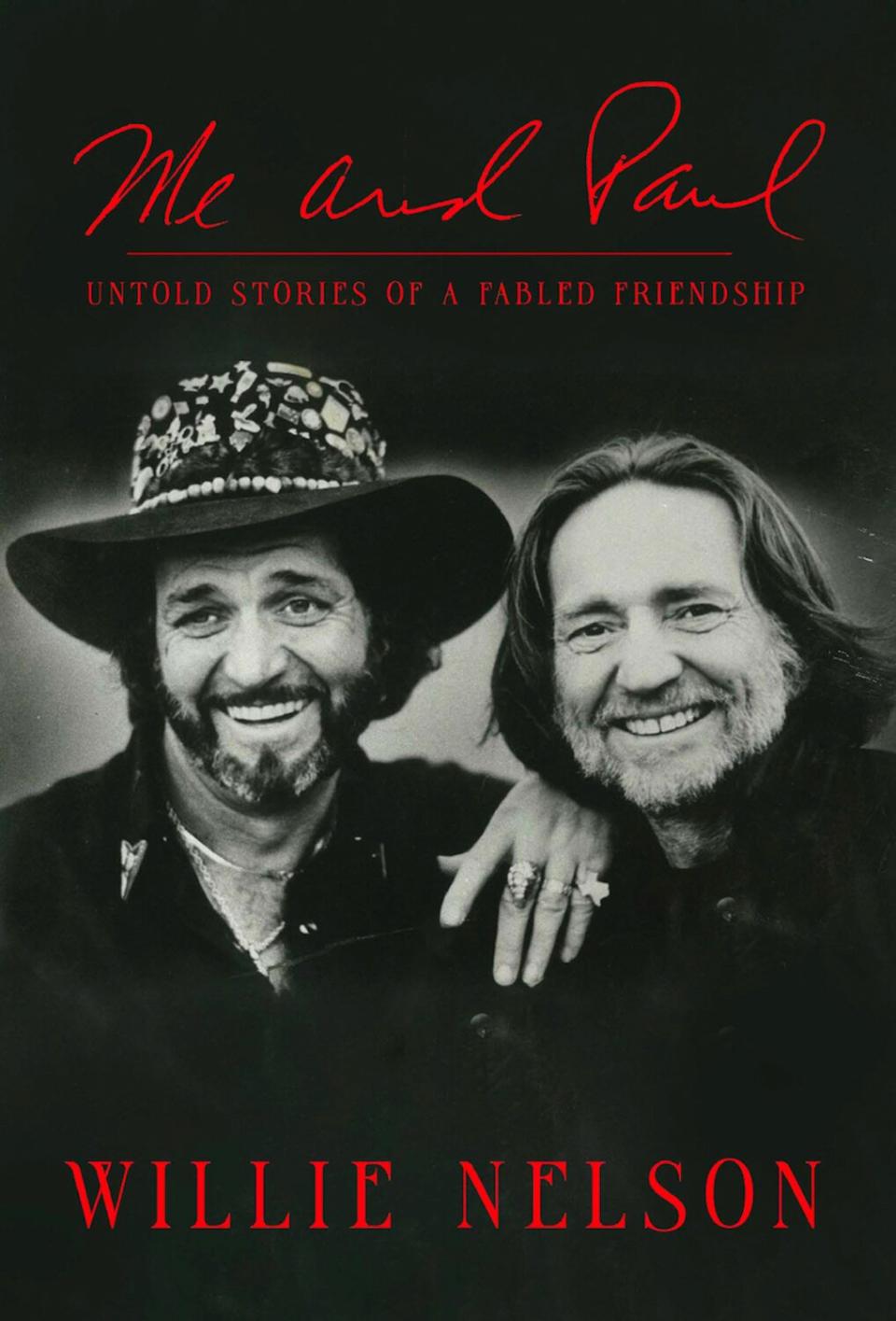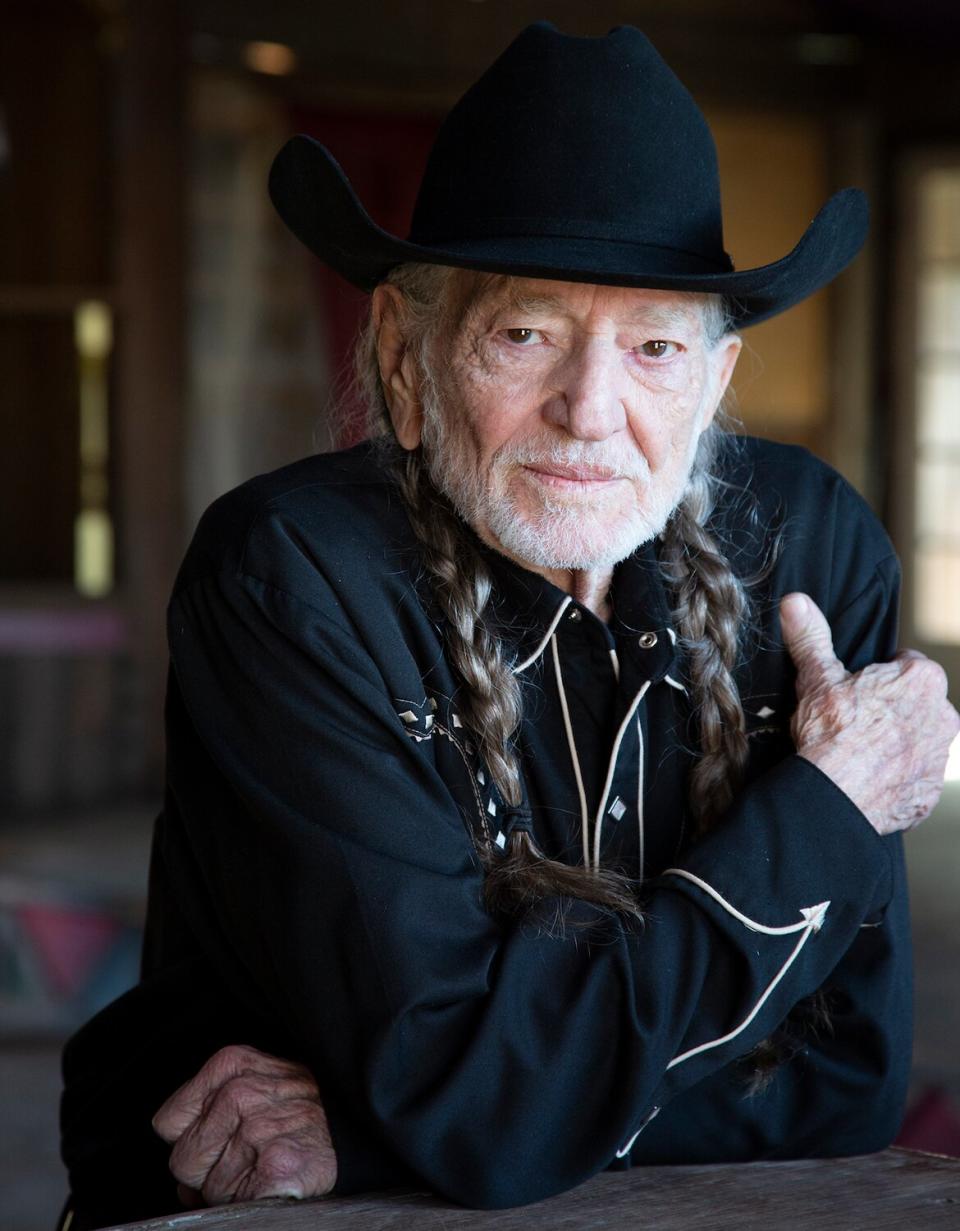Willie Nelson Recounts Past Suicide Attempt — and How Friend Paul English Supported Him After — in New Memoir

- Oops!Something went wrong.Please try again later.
- Oops!Something went wrong.Please try again later.
- Oops!Something went wrong.Please try again later.
Pamela Springsteen Willie Nelson
Editor's Note: This story includes graphic details of a suicide attempt.
When Willie Nelson met Paul English at a small Texas radio station in 1955, he had no idea the ways in which the relationship would change his life.
Over the years, the country legend, 89, and English—who'd go on to become his drummer, confidante and lifelong best friend—forged a bond akin to brotherhood that was immortalized in Nelson's 1971 hit "Me and Paul," and lasted until English's death in February 2020.
In the wake of losing English, Nelson has memorialized his friend with the book Me and Paul: Untold Stories of a Fabled Friendship (out Sept. 20), a touching tribute in which the highwayman recounts the many ways in which English helped shape and better his life for more than six decades.
Though the book is filled with plenty of humorous anecdotes, its most poignant moments come in excerpts like the below, during which Nelson, in a particularly rough patch in his career, attempts suicide. Thanks to English's unwavering belief in Nelson, the singer regains his footing and, of course, goes on to become one of the greatest country stars of all time.

HarperCollins
NASHVILLE, Early '60s
"King of the Road," the famous Roger Miller song, said, "Trailers for sale or rent." Well, we rented ours at the very place Roger was singing about: Dunn's Trailer Court. Used car lot on one side, cemetery on the other. I made it to Nashville, but from where I was sitting, the city wasn't exactly pretty.
This was me in my late twenties, trying to get a handle on things. I couldn't. I'd been encouraged by pals like Paul and pros like Mae Axton to make my mark in a city where country music had made many an artist a millionaire. But after months of hustling, I was still a pauper. This trailer park was several levels below the way my family had been living. Our run-down apartment in the boondocks of Houston looked better than the view of the tombstones right outside our dilapidated home on wheels.
My get-up-and-go attitude was challenged. That's saying something because my get-up-and-go attitude is deep inside my DNA. It's always been there, and I had believed, at least till I got to Nashville, it always would be. But Nashville was different. I hadn't ever lived in a place where singers and songwriters formed a big, vibrant community. I wasn't unwelcome in that community. But my problem was seeing how so many of its members were making a living making music while I wasn't. Not a dime. Not only was no one interested in my songs, I had a hell of a time finding a barroom where I could sing. I had to go back to hawking encyclopedias. And because my heart wasn't in it, I failed at that.
The one thing I could do was drink. But I was hardly what you'd call a good drinker. I'd either get sullen or, even worse, get crazy and pick a fight with someone twice my size. I'm not a bad fighter, but, if you do fight, it's best to stay well within your weight class.
Tootsie's Orchid Lounge was the spot. That's because it was two steps from the Ryman Auditorium where the Grand Ole Opry performed. You'd see everyone at Tootsie's, all the stars and would-be stars. As a would-be, I saw it as "water, water every where, nor any drop to drink." Here's Jim Reeves. There's Buck Owens. Say hello to Hank Locklin. Meet Ferlin Husky. These were all good guys who were writing good songs, looking for good songs, and recording good songs. Somehow, though, my songs didn't seem up to snuff.
Looking back over my life, my early days in Nashville were a definite low point. I'm not one to easily fall prey to depression, but depression had me in its grips. Throwing back bourbon on a freezing cold night at Tootsie's, I thought about an old song I'd heard Lightnin' Hopkins cut back at Gold Studios in Houston. He sang about feeling so bad until he lay his head on some lonesome railroad line and let it ease his troubled mind. So why not?
It had started snowing. There wasn't any railroad in sight, but there was Broadway—the city's main thoroughfare. Why not go out there, lie down in the middle of the street, and let some souped-up Plymouth Barracuda ease my troubled mind?
So I did. I lay, prepared to stay. Eyes closed. Ready to move on and move out. If this world wasn't working, maybe the next one would. I lay for five minutes, then ten, then fifteen. Don't know why—maybe it was the bad weather and the late hour—but there was hardly any traffic. If one or two drivers saw me, they swerved out of the way. Was I relieved? Was I disappointed? Can't say for sure. All I know is that I got up, went back to Tootsie's, and had another drink.

Pamela Springsteen Willie Nelson
★
"How in God's name you find me here?"
"I'm keeping track of you, son. You gotta know that by now."
Paul English was leaning on the hood of our trailer. It was four in the afternoon, and I was barely awake. It was the day after I'd tried to ease my troubled mind on Broadway. Paul's timing was uncanny.
Last night's storm had passed and left a bright blue sky in its wake. As usual, Paul was looking sharp. Clean as a whistle. Happy as a lark.
"A sight for sore eyes," I said.
"What you got to be sore about?"
"Rough night."
"Nice day."
"Didn't know you had clients in Nashville," I said to Paul.
"Got clients everywhere. Was up in Louisville and figured I'd stop by on my way to Memphis to see how you're doing."
"As well as could be expected," I said.
"I got high expectations."
"I got an empty stomach."
"Well then, enough said." His smile was wry and devilish and sweet. You never knew what was going to come out of his mouth next. "I got a lady who runs a rib joint down by Music Row that'll put the pep right back in your step, brother."
The rib joint was called Juicy Lucy's. Lucy lived up to her name. Green-eyed beauty with a personality as sweet as her peach cobbler. She ran the little place herself, running back and forth from the tiny kitchen to waitress the four tables where her customers lavished her barbecue with praise. Like Paul, her family came from Vernon, Texas. They said they were kissing cousins, but I'm guessing they were more than that. Paul introduced me as the hottest songwriter to hit Nashville since Hank Williams.
RELATED: How Willie Nelson and His 'Best Friend' Big Sister Bobbie Helped Each Other Through Tragedy
"Who happens to be cold as ice," I said.
"They say when Hank Williams came to Nashville, the Grand Ole Opry wanted nothing to do with him," Lucy said. "Making a name for yourself in this town takes time."
"I was just about to tell Willie the same thing," Paul said. "But coming from you, the words go down a little smoother."
Lucy smiled in a life-is-worthwhile way that lifted my heart. The pork ribs, potato salad, and cobbler lifted it even higher.
After lunch, Paul and I took a walk down Music Row. All the majors had offices and studios. Acuff-Rose. RCA. Columbia.
"We gotta go out tonight and celebrate," Paul said.
"Celebrate what?"
"You being here."
"I may not be here too much longer," I said.
"Why do you say that?"
"Look at these names on these buildings, Paul."
"Biggest names in the business."
"And not a one is letting me through the door."
"That's even more reason to celebrate."
"You're not thinking straight."
RELATED: Kacey Musgraves Recalls Bringing Her Actual Grandpa to 'Fantasy Grandpa' Willie Nelson's Poker Night
"I'm thinking of how these fools are gonna feel when you start having hit songs left and right. That's when they'll eat their hearts out for paying you no mind when they could have bought you for a nickel and nail."
"So, we're celebrating the far-off future, is that it?" I asked.
"Isn't far off at all. The past was Juicy Lucy's and her red-hot ribs. The future is now. Boy, don't you know that we're always living in the future?"
That evening I lost track of the future. I lost track of everything. Me and Paul went barhopping. Before long, I was wasted on whiskey when some brute started bad-mouthing Texas. Turned out he was an Okie. To borrow Merle Haggard's famous phrase, he was an Okie from Muskogee. I actually like Muskogee. I've played there. The Arkansas River runs right by. My people come from Arkansas. I once won good money playing dominoes in Tulsa. All us southwestern folks have a world in common. But this big ole boy was insulting Texas farm boys. As a certified member of the Future Farmers of America—I'd joined back in Abbott as a preteen—I took exception. I also took a swing. And missed. The Okie I missed wasn't about to miss me. He was about to crown me with a bottle of Pabst Blue Ribbon when Paul caught his arm and convinced him otherwise. On to the next bar.
The next day I woke up at noon. The hangover was monumental. Paul was on his way to Memphis. I took the kids to the park while Martha worked her afternoon shift as a waitress at the Hitching Post. At the time, she was carrying our family's finances. That fact hardly helped my mood. But Paul's trip had helped. In spite of my acting the fool at the bar the previous night, it was good being with someone who seemed to believe in me more than I believed in myself. He really believed in a rosy future at a time when I couldn't afford to buy my wife a dozen roses.
I wasn't sure about rosy thinking. Maybe that's because I had no concrete plans for hustling my music other than hanging out with the music hustlers whose hustles were working. That meant showing back up at Tootsie's to scope out the scene I'd already scoped out more times than I cared to remember. It was the same ole shit.
Except this time it wasn't. Something had changed. I'm not saying it was Paul's quick visit; Paul really had nothing to do
with it. Paul didn't even know Hank Cochran. Along with Mel Tillis, Hank was one of the first guys I met when I arrived in Nashville. More than the others, Hank had shown an interest in my writing. On this particular day his interest took a different turn. He made me an offer. Said he'd been hired by a publisher who paid him to write songs and thought maybe he could get me hired as well. It was an actual job that he worked, more or less nine-to-five. The idea floored me. Someone might be willing to pay me to sit around and write?
"Think so," Hank said. "But the pay isn't great."
"Not looking for great. Just looking to be a professional songwriter."
"Well, look no further."
The publisher was called Pamper. Interesting name cause I did feel pampered. Never before had I been given an empty office and told to do nothing but write. I greeted the walls with "Hello Walls," a song Faron Young recorded. The thing ran up to number one, and the next I knew, Ray Price decided to give my "Night Life" new life and, even better, hire me as a bass player in his band, the Cherokee Cowboys. Ray didn't even care that I didn't know how to play bass.
Paul had predicted my immediate future, and when I saw him next, down in Texarkana, he had another prediction. The Cowboys had shared the bill with Patsy Cline, who'd recorded "Crazy," one of those forgotten songs I'd written down in Houston that turned into her biggest hit. All to my surprise.
"You're hotter than a pistol," Paul said after the show. "I just don't see why you don't have your own band."
"I've always dreamed of being a Cherokee Cowboy," I said. "Ray knew Hank Williams. Lived with Hank Williams. Took over Hank's band when Hank died. Ray Price is a link to a history I started dreaming about when I was a kid. Besides, he's a great guy."
"I'm seeing the link between you and the gal he's got singing with you."
"Shirley Collie?" I asked.
"The yodeler."
"She really gets me."
"That's what I'm saying, Willie."
"We have a tight harmony."
"How tight is tight?"
I didn't have to answer Paul because he already knew the answer.
Later that year—1962—I divorced Martha (or, to be more precise, Martha kicked me out), and in 1963 I married Shirley. Shirley and I left Ray Price and formed our own group. I also cut my first album. It was for Liberty Records, who still saw me more as a writer than a singer. That's why they titled my debut album, . . . And Then I Wrote. Critics said my singing was out of kilter cause my time was out of kilter. Critics don't buy records, but in this case neither did the public. The album, featuring a clean-cut Willie Nelson on the cover wearing a conservative suit and tie, flopped like a flounder out of water.
I cared, and I didn't care. I cared because no one likes failure. But I also didn't care because I liked my style of singing—I couldn't imagine singing any other way—and had no intention of changing. The singers I admired most—everyone from Louis Armstrong to Jack Teagarden to Ernest Tubb to Jimmie Rodgers to Crosby and Sinatra—had quirky styles. Those styles sounded natural. They sounded conversational. When I sang, I was looking to have a musical conversation. No more, no less. If you didn't like the conversation, fine. If you did, so much the better.
The release of this first album, despite its meager sales, did wonders for beating back the blues. It brought out that hustler energy. When I'd arrived in Nashville two years earlier, that energy had been exhausted. I felt revitalized by a new marriage and a new career.
On April 29, 1963, I turned thirty. Song royalties were slow to accrue, but there was definitely money coming in. And even though my album didn't earn me a cent, I was able to tour. I even got a gig at the Golden Nugget in Vegas. It was a kick to ride down the Strip and see the marquees advertising Liberace and Wayne Newton. At a time when the Rat Pack was riding high, the town still had room for a country act like mine.
After Vegas, I was back in Dallas. It was an especially happy occasion because I was playing the Longhorn Ballroom, now owned by Dewey Groom. That's where I'd seen Hank Snow and secretly dreamed that maybe one day I could play the place. That one day arrived. And so had Paul English.
"Drove up from Galveston just to see you," he said. "I had to be here for this."
"Glad you came, Paul."
"You'll be even gladder when I tell you what I've arranged."
"What's that?"
"The Willie Nelson Ballroom, a place that'll make the Longhorn look like a tearoom. It's a million-dollar operation."
"And who's underwriting this million-dollar operation?" I asked.
"Jack Ruby."
From Me and Paul: Untold Stories of a Fabled Friendship by Willie Nelson. Copyright © 2022 by Willie Nelson. Reprinted by permission of HarperCollins Focus.
If you or someone you know is considering suicide, please contact the 988 Suicide and Crisis Lifeline by dialing 988, text "STRENGTH" to the Crisis Text Line at 741741 or go to 988lifeline.org.

